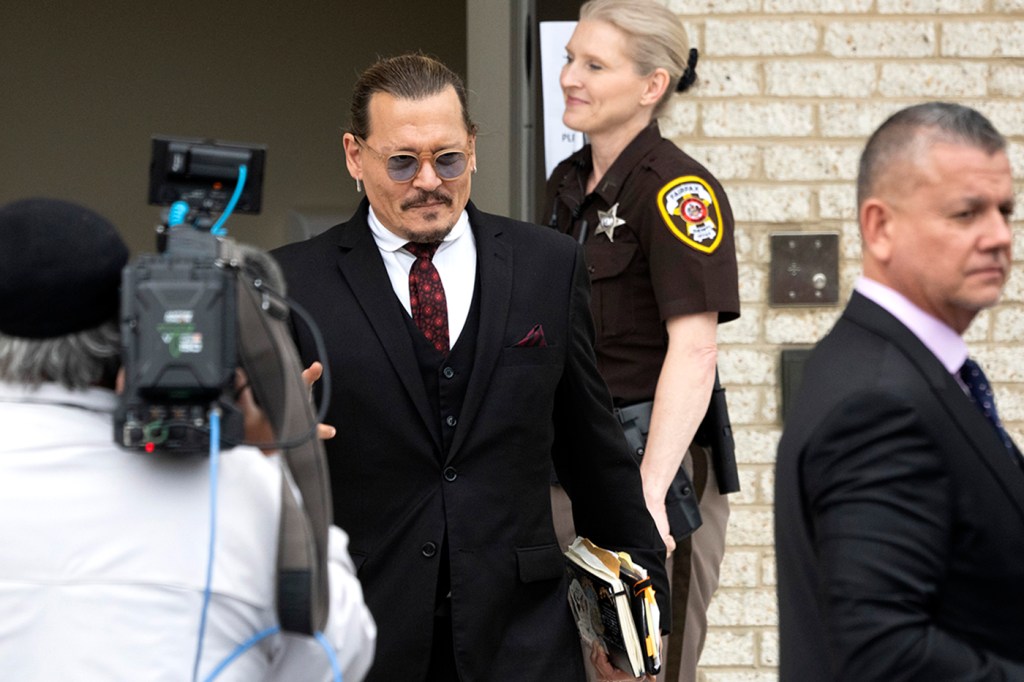How the Johnny Depp case took over the Internet, and what this could mean for victims of domestic violence

Testimony in the six-week Johnny Depp versus Amber Heard defamation trial comes to a close on Friday. The actors were married for 15 months between 2015 and 2016, then separated amidst a bitter, high-profile divorce during which Heard accused Depp of domestic violence.
Now, the couple is embroiled in an intense defamation case over the abuse allegations. The case has caused a media frenzy, with many fans coming forward in support of Depp with hashtags such as #JusticeforJohnny, and some engaging in online harassment toward Heard. As the jury begins its deliberations, Northeastern experts say that regardless of the outcome, this oversized reaction may have social consequences that will resonate far beyond the trial itself.
At the heart of the case is whether Heard defamed Depp when she wrote an opinion piece in The Washington Post in December 2018 claiming that she was a domestic abuse survivor.
While Depp is not named in the article, in his March 2019 lawsuit he claims that it “plainly was about” him and that it “brought new damage to Depp’s reputation and career.” According to the lawsuit, Disney dropped Depp from the Pirates of the Caribbean franchise four days after the article was published. He is suing for $50 million, and she is countersuing for $100 million.

Left to right: Mary Landergan, professor in the school of law, Laurel Leff, professor of journalism and Margo Lindauer, director of the Domestic Violence Institute at Northeastern’s School of Law. Photos by Matthew Modoono/Northeastern University and Ruby Wallau/Northeastern University
According to Mary Landergan, professor at Northeastern’s School of Law, for Depp’s suit to succeed, his team must prove that the article was about him, that the article was false, and that it hurt his reputation. In addition, “there’s a degree of intent that you have to show,” she says. “They would have to show that Amber Heard knows it’s false, or she’s recklessly disregarding the truth.”
Over six weeks of testimony, Depp’s team attempted to do just that in a jury trial in Virginia, where the Washington Post is headquartered. Depp claims that Heard was physically abusive during their relationship, while Heard alleges that Depp was both physically and sexually abusive. Both Depp and Heard deny the other party’s claims.
Throughout the trial, lurid details of the couple’s tumultuous relationship—which have lived online for a number of years now—have enthralled users and internet culture more broadly, prompting many to take sides. But perhaps the most notable fact about this case, Northeastern experts say, is the oversized reaction to it, especially in Depp’s favor. Hashtags like #JusticeforJohnnyDepp and #MenToo have trended on Twitter, and TikTok posts with #JusticeForJohnnyDepp have garnered millions of views.
“It seems like the world is rallying in favor of Johnny Depp,” Landergan says.
Part of the reason for the attention, says Laurel Leff, professor of journalism at Northeastern, is the fact that the trial is available for public viewing online. Not all trials are filmed, and this wasn’t a practice until the early 90s, when the TV channel CourtTV began to air certain trials. Most notably, in 1995, the OJ Simpson trial, which was broadcast on TV, received similar attention from viewers and the public
Similar to the Simpson trial, it’s not the legal issues at play that interest people in the Depp case, Leff says; rather, it’s the cult of celebrity.
“I think it’s primarily the celebrity aspects of it and the tawdriness of it,” she says. Here, the public is driving the conversation about the case, rather than the media.
“It’s being driven by people as opposed to journalists identifying that as something they should pay attention to,” Leff says. “They’re paying attention to it because the public is paying attention to it.”
Online harassment of Heard has been considerable—#AmberHeardlsApsychopath and #AmberTurd have both trended on Twitter at various times throughout the trial, and she has been called names such as “gold digger” and “crazy bitch,” which Landergan calls “troubling.”
“It’s been turned into a circus and I find it very disturbing,” Landergan says. “It’s gotten out of control.”
The attention to the case could bring to light how men can be victims of domestic violence as well as women. Margo Lindauer, clinical professor at Northeastern’s School of Law, says that there is parity among genders when it comes to some types of domestic violence.
While violence that leads to severe injury, hospitalization and arrest is typically perpetrated by men, when it comes to “situational couple violence”—like pushing, screaming, or threatening, without significant injury—”that sort of behavior has parity among genders,” she says. Additionally, it can be very difficult for men to report this violence, as it is with women.
“Violence and reporting violence is stigmatized for all genders,” she says. “Domestic violence in general is underreported.”
In addition, the violence in this case could have been on both sides, and this could help us better understand the nuances of violence, Lindauer says.
“I think it’s definitely bringing to light unhealthy behaviors and violent tendencies that different people bring to a relationship,” Lindauer says. “And I think that it also potentially is making us have a conversation about underreported violence.”
But the court of public opinion siding so heavily in Depp’s favor may be a signal of more than just the way viewers understand the evidence, or Depp’s celebrity—it could also signal underlying misogyny, Lindauer says.
“I think people are so quick to disbelieve women, and to not want to believe,” Lindauer says. The public’s focus is on the weaknesses of Heard’s case, Lindauer says, rather than Depp’s.
“It’s weird that there’s just one singular narrative,” she says, adding that “her life has been derailed, too, in all of the same ways.”
Heard, in addition, is “not a perfect victim,” Lindauer says. For example, Heard has admitted in audio tapes to hitting Depp, and she was arrested for domestic violence in 2009. “People have a hard time holding that nuance, that you can be a victim and also not be a perfect person, or also have perpetrated violence or not behaved perfectly.”
This reaction could have implications for domestic violence victims in the future, Landergan says.
“There’s been so much harassment against her, that it makes me worry that people are going to be nervous to come forward with claims of domestic violence,” she says.
For Leff, the hope is that it won’t come to this, and that it won’t discourage the public from believing women.
“It’s just one case,” she says. “People are enjoying watching the spectacle. Will they then read into the spectacle more than should be read into it?”
If you are experiencing domestic violence, contact the National Coalition Against Domestic Violence, SafeLink Massachusetts, or Northeastern’s Sexual Violence Resource Center.
For media inquiries, please contact media@northeastern.edu.






